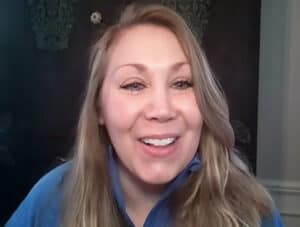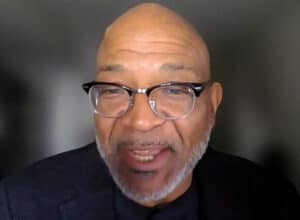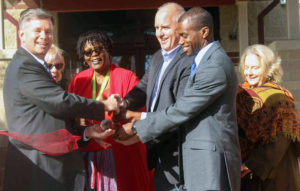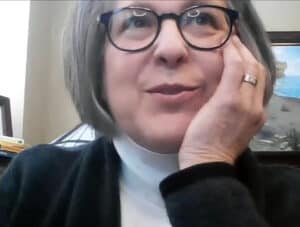CHHSM, United Church Homes, CBLF Share Spotlight on Collaboration Presentation

A recent meeting of UCC ministries illustrated how much collaboration can create community engagement and benefit everyone. The UCC’s Living Water (Ohio NorthEast) Spire Center, which assists the association’s churches in ministry, in late January brought together the UCC Church Building and Loan Fund (CBLF), UCC Council for Health and Human Service Ministries (CHHSM), and United Church Homes (UCH) for a Zoom presentation on community resources. The Rev. Dr. Elyse Berry, associate for advocacy and leadership development, presented for CHHSM.
“It was such an honor to be part of this important event,” said Berry. “I left feeling uplifted and deeply connected.”
First up was CHHSM partner CBLF. The Rev. Dr. Patrick Duggan, executive director, introduced local church representatives in attendance to the ministry, explaining that it trains about 1,000 church leaders a year in 300-400 local churches. He explained that when a church comes to CBLF asking for help, Duggan and his staff guide church members through a process defining the purpose of the local church. “The piece that’s uniquely the church is what’s key,” Duggan said. “The first thing is WHY — what’s their mission? There’s uniqueness that God wants to address. Why did God place you in this space to do ministry? What’s the vision for that place?”

Duggan added that it’s important to know the church’s unique strengths — is it choir? Bells? Dance? Arts? Health outreach? A special event? Often times, he said, members respond, “Oh, we don’t do anything special,” but when you dig deep, you find there is.
Duggan described three key CBLF programs: Transform Church, Transform Community, a curriculum CBLF developed to help churches work toward the “future church,” instead of church as we’ve always known it; Adese Fellowship, a spiritual entrepreneurship where faith-driven leaders are equipped for a revenue-generating enterprise that’s faith driven; and Partners In Vision, that aids churches wishing to engage in large or complex church redevelopment. The main ingredient in all successful projects, he added, is collaboration.
Two recent examples of Partners in Vision are CHHSM agencies, Duggan said: MOLO Village Community Development Corporation in Louisville, Ky., and Resurrected Life in Scranton, Pa.
Berry spoke next, explaining that key to much of what CHHSM members do is based on the UCC’s value of extravagant welcome. “Whoever you are, you can work in our agency in our organizations,” she said. “People in our organizations often have their lives touched in really profound ways.”
That welcome extends to the community. “Together is a tag word we use a lot,” Berry said, adding that from small CHHSM agencies to huge organizations, CHHSM provides some $1 billion of uncompensated care each year. “That’s the church!” she added.
Through such activities as CHHSM’s Annual Gathering and its Nollau Leadership Institute, among other offerings, CHHSM members and friends build connections and learn ways to partner with community organizations to serve their communities more effectively.
“We do a lot of the ‘Stone Soup’ thing,” said Berry. It starts with asking who is our community and who can we partner with, she added.

In addition to MOLO Village, Berry cited two other examples of successful CHHSM-community partnerships: South Haven Woods in Bedford, Ohio, an affordable senior housing community opened in 1989 and expanded in 2019, thanks to a partnership between South Haven UCC and CHHSM’s United Church Homes; and St. Louis’ Salam Clinics, a collaboration between CHHSM’s Deaconess Nurse Ministry, Epiphany UCC, St Peter’s UCC in Ferguson, St. Peter’s UCC in Washington, Muslim Community Services of St. Louis, Missouri Health Care for All, and several other community organizations and churches to offer affordable health care and mental health services to low-income areas of the city.
The Rev. Beth Long-Higgins, director of UCH’s Parker Center for Abundant Aging, Nate Bollinger, vice president of asset stewardship and development, and Dan Fagan, vice president of housing, presented the segment on United Church Homes. Long-Higgins delved into aging in place, and the desire of most older adults to age in place for as long as possible. UCH, she said, “tries to provide places where individuals as they age can be safe and afford that safety, have a roof over their head, and have a community of which to be a part.”

Comprised of 86 communities, UCH affirms its commitment to DEI, and its communities are Human Rights Commission and Sage certified, a program that helps older adult health care providers create more LGBTQ+ welcoming organizations. “Only 200 communities in the country have participated in the HRC/Sage program,” she said.
Both Bollinger and Fagan introduced participants to the affordable housing and middle market housing projects of UCH.
The meeting concluded with a screening of It Takes a Village, the award winning documentary about MOLO Village. The documentary won the UN Hero Award during the UN Habitat Better Cities Film Festival in 2022.
“The connections between CBLF, CHHSM, UCH, and MOLO Village moved me in a way I didn’t expect,” said Berry. “It is one thing to be invited to talk about what CHHSM is and who our members are, and another to experience the incredible collaborations in real time with the fellow presenters. It bring to life the scripture passage for the CHHSM’s recently-concluded Annual Gathering: ‘It’s better to have a partner than go it alone. Share the work, share the wealth. …’ (Ecclesiastes 4:9).
“These kinds of events foster the skills of prophetic imagination and illustrate how we can learn from the many connections in the church in ‘making a new thing.’”
Join Our Mailing LIst
Follow on Facebook
Iredell Adult Day Services Hosts Ribbon-Cutting to Celebrate Adult Day Health Certification - CHHSM
www.chhsm.org
Iredell Adult Day Services (IADS) in Newton, N.C. — a nonprofit organization dedicated to caring for older adults, vulnerable groups, and their families, and part of EveryAge — hosted a ribbon cut...